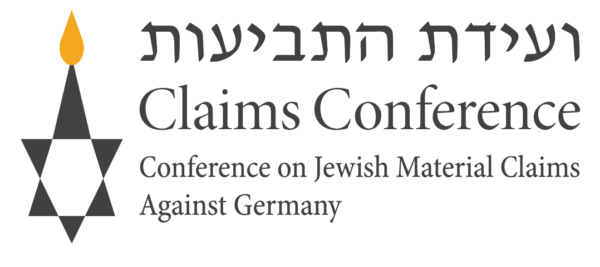Survivor Testimonies Engage Students in Holocaust History
Claims Conference in the Media | Press Inquiries | Publications | Videos | Updates
This post is for historical informational purposes only. Please do not refer to this post for information pertaining to current Claims Conference programs. Visit What We Do for current program guidelines and information. Thank you.
May 1, 2007

The students from left: Edward Foley, Bria Waters, Adriel Carrasco, Sarina McDuffy, Lee Martin.
Through a program funded by the Claims Conference, a group of 8th graders in Philadelphia, Pennsylvania who had never before learned of the Holocaust found themselves deeply affected by these first-person narratives during a month-long educational unit on the Shoah.
Victoria Monacelli, a teacher of reading and language arts at the Warren G. Harding Middle School, incorporates technology into her curriculum in order to engage students. As part of her literacy program, her students produce a monthly “podcast,” a recorded oral presentation on a specific topic for which the students conduct extensive research in order to produce a script. The podcasts are reproduced on websites and can be downloaded into MP3 players.
In January 2007, the podcast topic was the Holocaust. As the students began their research, many of them deeply disturbed by what they were learning, they came across the Voice/Vision Holocaust Survivor Oral History Archive at the University of Michigan-Dearborn, which holds 300 recorded interviews. “Needless to say, they were unable to pull themselves away from it. They sat with headphones for days and listened to each of the personal accounts as they read along. It really opened their eyes to the personal and emotional aspects of the Holocaust that often cannot be captured in the written word,” said Ms. Monacelli.
The Voice/Vision Archive serves as a repository of Holocaust survivor testimonies that have been recorded and collected over the past 25 years. The Archive endeavors to make the testimonies widely accessible for researchers and the general public by uploading the transcribed interviews on its website and sharing the audio and video tapes free of charge. In recognition of the scholarly and educational value of the Voice/Vision Archive, the Claims Conference made an allocation in 2005 for transcribing and research of existing testimonies. This grant helps the Archive add more testimonies to its website and thereby share its resources with the wider public.
Since the grant was awarded, 25 testimonies have been transcribed and placed on the website, along with all the collateral educational materials. This educational information consists of a corresponding map highlighting places referenced in the testimony, a summary of the testimony and a topical organization of the testimony.
The students incorporated selections from the Archive’s recorded interviews into their podcast, as they believed that second-hand narration of survivors’ experiences could not duplicate the impact of survivors’ own words. As the students listened to the interviews, they became engrossed in the survivors’ stories in a way that their teacher said she has never before seen. They related to the survivors as real people, not as abstract parts of history.
“Because of Voice/Vision they feel personally connected to the event, which leads to a much deeper level of understanding. Although their final project will only be about 12 minutes long, the Voice/Vision archive has helped them bring the story to life for them as well as all of the other teenagers that will listen to the final product… Our kids today live in a very technologically advanced world where reality is mixed with non-reality. They often do not distinguish between what is real and what is computer-generated. Kids today communicate so digitally at times that they lose the personal and emotional aspects of what is going on around them. The Voice/Vision project has reminded them that the Holocaust affected real people with real feelings in real ways,” said Ms. Monacelli.
“This would not be possible without the grant from the Claims Conference,” said Dr. Jaime Wright, curator and historian of the Voice/Vision Archive. “The use of our collection by Ms. Monacelli’s class in such a moving way only serves to evince the power that these interviews have to educate. Through the Voice/Vision website, our interviews are accessible to anyone with access to a computer, 24 hours a day, seven days a week.”

